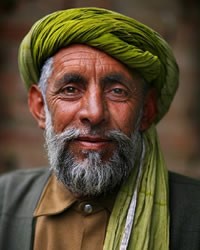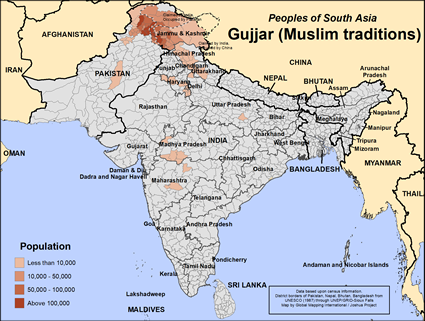Gujjar (Muslim traditions) in Pakistan

Photo Source:
Copyrighted © 2026
Matt Brandon All rights reserved. Used with permission |

Map Source:
People Group data: Omid. Map geography: UNESCO / GMI. Map Design: Joshua Project.
|
| People Name: | Gujjar (Muslim traditions) |
| Country: | Pakistan |
| 10/40 Window: | Yes |
| Population: | 2,576,000 |
| World Population: | 3,601,000 |
| Primary Language: | Hindko, Northern |
| Primary Religion: | Islam |
| Christian Adherents: | 0.00 % |
| Evangelicals: | 0.00 % |
| Scripture: | New Testament |
| Ministry Resources: | No |
| Jesus Film: | Yes |
| Audio Recordings: | Yes |
| People Cluster: | South Asia Tribal - other |
| Affinity Bloc: | South Asian Peoples |
| Progress Level: |
|
Introduction / History
The Gurjara clan appeared in northern India in about the fifth century AD. During the Muslim conquest in the Indian subcontinent, many of the Gurjar Hindus converted to Islam. Gujjars are mainly concentrated in the Indo-Gangetic plains, the Himalayan region, and eastern parts of Afghanistan, but some are established in Pakistan. Gujjars have given their names to several places in Pakistan, including Gujranwala, Gujjar Nallah, Gujar Khan, Gojra and Gujarat.
What Are Their Lives Like?
We know very little about the Gujjar people. They are often mistaken for the Gujar, a group of herdsmen.
What Are Their Beliefs?
There are both Hindu and Sunni Muslim Gujjar people. The Sunnis believe that the supreme God, Allah, spoke through his prophet, Mohammed, and taught mankind how to live a righteous life through the Koran and the Hadith. To live a righteous life, you must utter the Shahada (a statement of faith), pray five times a day facing Mecca, fast from sunup to sundown during the month of Ramadan, give alms to the poor, and make a pilgrimage to Mecca if you have the means. Muslims are prohibited from drinking alcohol, eating pork, gambling, stealing, slandering, and making idols. They gather for corporate prayer on Friday afternoons at a mosque, their place of worship.
The two main holidays for Sunni Muslims are Eid al Fitr, the breaking of the monthly fast and Eid al Adha, the celebration of Abraham's willingness to sacrifice his son to Allah.
Sunni religious practices are staid and simple. They believe that Allah has pre-determined our fates; they minimize free will.
In most of the Muslim world, people depend on the spirit world for their daily needs since they regard Allah as too distant. Allah may determine their eternal salvation, but the spirits determine how well we live in our daily lives. For that reason, they must appease the spirits. They often use charms and amulets to help them with spiritual forces.
What Are Their Needs?
Centuries of commitment to a religion that denies the deity of Jesus is not quickly overcome.
Prayer Points
There are few if any followers of Jesus among the Gujjar community, but pray for those who will soon be found.
Pray the Lord will send them qualified pastors and teachers.
Pray that Scripture will be easily available to them. Pray that the large Gujjar community in Pakistan, and in other countries, may be strongly drawn to the man Jesus.
May the Holy Spirit give them a hunger for truth and righteousness.